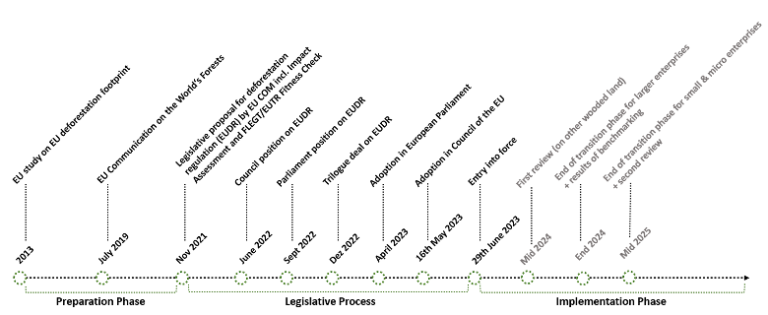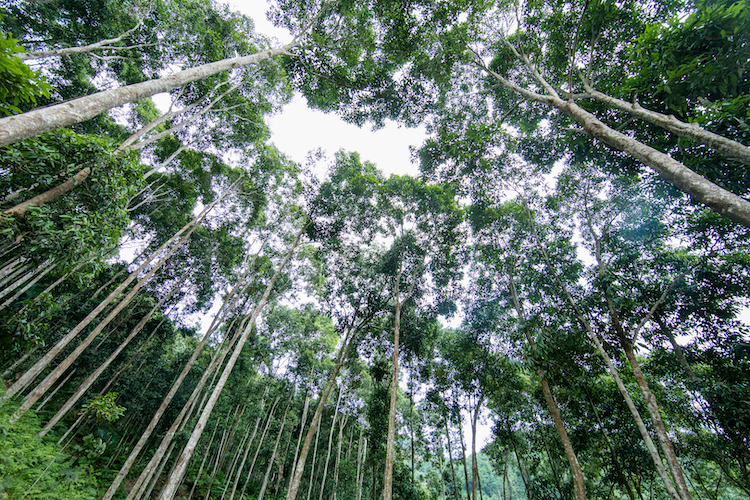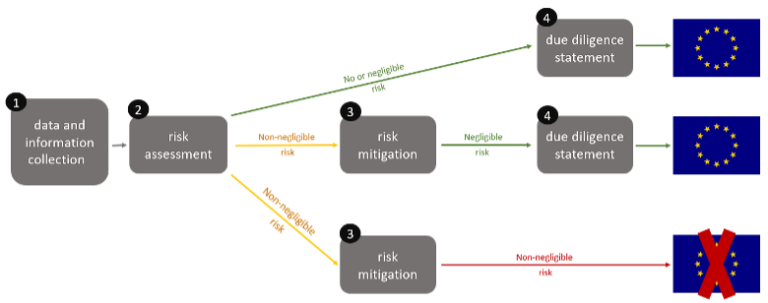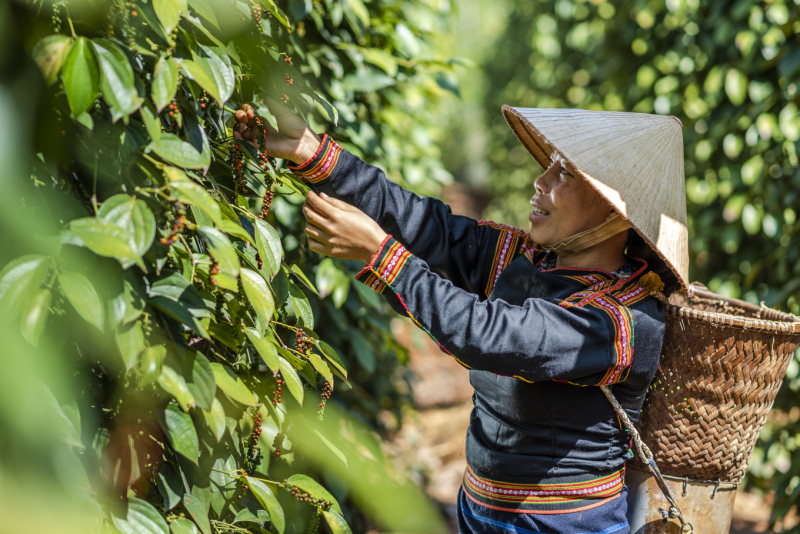Why EUDR
Europe is a significant importer of commodities associated with deforestation. It imports approximately 50% of the world’s coffee and 60% of cocoa, leading to an estimated loss of 25% of global tree cover between 2001 and 2025 The EU Anti-Deforestation Law Regulation (EUDR) is a novel EU initiative that arose from the results of a deforestation trail study conducted since 2013 This regulation will undergo a legalization period between November 2021 and 29th June 2023 before it officially takes effect.

Roadmap for establishment, entry into force and official application of EUDR (Source: Initiative for Sustainable Agricultural Supply Chains (INA) – Franziska Rau)
The aim of the EUDR is to decrease deforestation caused by forestry and agricultural activities globally. It is a crucial component of the EU’s approved European Green Deal, Biodiversity 2030 strategy and Farm to Fork strategy
The regulation establishes compulsory due diligence regulations for all suppliers and exporters operating within the European market. This regulation applies to products within the 7 initial categories, which include coffee, cocoa, soybeans, palm oil, cattle (beef and cowskin), rubber, and wood and wood products (such as printing paper and furniture).
In the upcoming roadmap, sizeable businesses will undergo a period of transition and be subject to enforcement as from the conclusion of 2024 (translating to 18 months). Smaller enterprises will undergo a transitional period and comply officially from the middle of 2025 (translating to 24 months). Throughout this process, the EU will adopt a comparative approach to ensure coherence of regulatory concerns with other regions and nations worldwide.
Objectives of EUDR
- Reducing the EU’s impact on greenhouse gas emissions and global biodiversity loss;
- Reducing the EU’s impact on global deforestation and forest degradation.
Through this Regulation, the EU aims to:
- Ensure that products (in the category) sold and consumed on the European market do not contribute to global deforestation and forest degradation caused by the expansion of agricultural production;
- Reduce carbon emissions from the production and consumption of products on the European market by at least 32 million tonnes per year
Who is affected by EUDR
- Operators and Traders
- All products are put on the EU market (imported/manufactured in the EU and distributed on the EU internal market) and exported from the EU
- Importing companies in the EU market are responsible for fulfilling the due diligence obligations as shown below:
EUDR Enforcement Responsibilities
The EUDR regulation is concretized with 10 requirements and 48 compliance criteria, including:
- Land use rights;
- Environmental protection;
- Labors’ rights;
- Human’s rights;
- Taxes, Fees;
- Anti-corruption;
- Sustainable forest management (focusing on combating deforestation and forest degradation);
- Traceability;
- Risk Management;
- Mitigation measures.
In general, manufacturers, operators and traders need to meet the 3 main factors below:
- Proof of non-deforestation: As of 31/12/2020 on the basis of the current status of forests announced by the EU through the positioning and traceability system for each land parcel (central positioning for land parcels less than 4ha; polygonal positioning for land parcels over 4ha);
- Comply with local laws (land use rights, environmental protection, taxation, human rights, workers’ rights,…);
- Risk assessment and mitigation measures.
How will the EUDR be enforced?
- Create a standard system that classifies risks associated with cutting down and degrading forests (low, medium, high) by country.
- The inspection rate will be determined by the established levels (high risk: 9%; standard risk: 3% and low risk: 1%) which will also evaluate the compliance level with the law in a thorough and comprehensive manner. The cost of conducting due diligence will vary based on the risk level.
- A common electronic information system (managed by EU COM) will be utilised by the EU for control purposes, while Member States will be able to acquire pertinent product information such as the geographic coordinates of the manufacturing country
- Anonymized data will be made widely available to promote transparency.
- Penalty of at least 4% of total turnover in the European market; higher penalties, including temporary exclusion from public procurement packages and access to public funds (up to 12 months), may be considered; temporary ban on imports into/exports from the EU market, depending on the seriousness of the infringement.
- The EU will periodically carry out risk assessments and ratings at the national or territorial level based on:
+ Rate of deforestation and forest degradation;
+ The rate of expansion of agricultural cultivation area for related industries;
+ Production trends of related categories and products.
- The EU gathers and assesses additional information supplied by producing nations (via governments, NGOs, associations, businesses, and other entities), agreements aimed at tackling deforestation and forest degradation (between the EU and nations), pertinent legislation, and transparency, along with any sanctions imposed by the EU Council or the UN Security Council.
- The EU will have a roadmap to review and update in the next 5 years from the effective date of the regulation, in which:
+First 2 years: Impact assessment accompanied by proposals to expand eligible industries (e.g. maize, biofuels)
+ First 5 years: Conduct joint assessment (in accordance with EU regulations), proposals on: Addition of trade instruments; impact on farmers (especially small farmers); definition of forest degradation thresholds, rules on polygon positioning; trade fraud; control efficiency of competent authorities.
Positive impacts of EUDR on Vietnamese businesses:
- Creating a level playing field for businesses in the European market;
- Increase competitive advantages for enterprises with sustainable production activities, gain market share from exporters exploiting from countries assessed to have a high level of risk. The level of risk will be changed.
- The timber and coffee industry will face significant repercussions due to new European regulations. Nevertheless, Vietnam is establishing a free trade agreement with Europe, laying the groundwork for the exportation of wood products by Vietnam and the EU (VPA/FLEGT). This includes legal regulations that will foster the development of Vietnam’s wood industry and raise its profile, thereby facilitating growth in ancillary sectors, including those of coffee, rubber, cocoa, and cashews.
Challenges for manufacturers in Vietnam
- Difficulties in gathering information on parcels due to fragmented and unconcentrated production scale; supply chain involves many small traders/processors; inefficient traceability.
- Cost pressures due to additional traceability and legality requirements of EUDR;
- Limited market access for farmers and producers due to lack of land parcel and shipment traceability data (held by companies and certification bodies)xuất nguồn gốc lô hàng (vốn do doanh nghiệp và tổ chức chứng nhận quản lý);
- There is no consensus between Europe and Vietnam on the different definitions of forests, deforestation and forest degradation;
- Updating of Vietnamese legislation (on: water and environmental pollution in the processing of agricultural products, use of toxic agrochemicals,…) to meet EU requirements.
References:
- https://www.global-traceability.com/eudr-eu-deforestation-free-regulation/?gclid=Cj0KCQjw7uSkBhDGARIsAMCZNJtqITEBrycg7MX1PZFH-gE01yaiDR74g7WzKcaNm1lv6wV0A7rUleQaAm7tEALw_wcB
- https://environment.ec.europa.eu/topics/forests/deforestation/regulation-deforestation-free-products_en
- https://www.consilium.europa.eu/en/press/press-releases/2023/05/16/council-adopts-new-rules-to-cut-deforestation-worldwide/
- Biodiversity: deforestation-free products on the EU market – 18 November 2021 – #EUGreenDeal
- EU Regulation on Deforestation-Free Products – GIZ Initiative for Sustainable Agricultural Supply Chains (INA); Franziska Rau
- EU Non-Deforestation and Forest Degradation Products Regulation (EUDR) and Performance Indicators – Centre for Rural Economy Development; Nguyen Thi Lam Giang
- National Action Plan for Vietnam Coffee sector to comply with EUDR – Nguyen Do Anh Tuan – Director, International Cooperation Department, MARD








